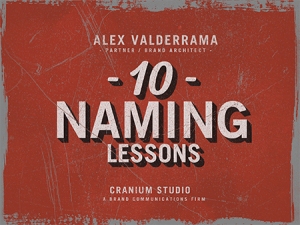 Written by Alex Valderrama, Founder and Principal of Cranium Agency
Written by Alex Valderrama, Founder and Principal of Cranium Agency
There is a lot that goes into choosing the right name for your business, product, or service. A clear articulation of the brand, it’s unique offerings, and the competitive landscape are a few main factors that should be taken into consideration. If done properly, a strong name for your new brand should help differentiate it from your competitors, increase the brand equity, and create a strong brand preference.
Below are the top ten lessons I have learned in the past twenty-five years working with companies on their brand initiatives, which have involved naming.
Lesson 1. Become A Pioneer
One of the biggest mistakes most companies make is choosing a name that does not differentiate themselves from their competition. The general attitude seems to involve not taking a risk, which is entirely the opposite of a correct naming strategy. Taking a risk and becoming a pioneer in your industry is what will set you apart and provide differentiation between you and your competitors. When choosing a name it is important to connect with your customers, so an early clarification of several brand components may be in order. These clarifications include definitions of your brand character, brand position, brief description, positioning in the marketplace, etc. Your trademark name is what will create an association between you and your customers and become a primary identifier.
Lesson 2. I Am Who I Am
Once you have selected a short list of names for your company, product, or service, it is important to research these names using tools such as Google, Bing, and Yahoo to find out how much “noise” there may be in any of the possible name choices. The “noise” refers to the number of hits each name gets from the search. This exercise should provide you with enough information to make a calculated analysis of the initial risks involved. Remember, this search should not be used as a definitive evaluation of your risks. Hiring an intellectual property attorney will help to refine your short list further and help you resolve risks that are apparent in advance. Also, be sure to take into account that timing is always critical. Put another way, if someone else has begun using your name, or one very similar, they can endlessly assert their rights that will interfere with your long-term business plans. Your ability to be the first one on the block to use a particular name for a specific product or service is crucial.
Lesson 3. You Are At War
As mentioned above under the heading “Become A Pioneer”, it is important to do an initial brand study to include your competitors. It is easy to forget when launching or re-launching a new company, product, or service that you are competing for a market share. Research how your competitors describe themselves, how they position themselves in the market and study the names used in that industry for trends. These, along with other factors, should provide you with useful information on name usage and how to best compete within your industry.
Lesson 4. Leave A Legacy
Using your given name, such as Smith Inc., may or may not be a good solution. It is important to look forward one, three, and ten years. Even though some naming professionals will advise that using your own name is the best way to go, I suggest that using your own name may in all actuality create a multitude of complex issues down the road. These complex issues can include selling your company to a prospective buyer, creating a partnership, and the overall fact that your last name may not be a good choice for the overall benefit of the brand and what it stands for. If your company’s brand is seen as an “individual” as opposed to a “business” brand, you may have trouble selling it. Our recommendation is to throw your name into the list, but be objective on the pros and cons. The outcome will be a more thought-out and strategic solution.
Lesson 5. My Exit Plan Before I Start
Many people start a business and do not consider what they would like to do with it once they are done with it. Provide yourself some time to think about what you would ultimately like to do with the new company, product, or service once you are ready to retire or move into another business. Would you like to sell, merge with another company, engage in a partnership, or create a system of junior partners that will eventually take it over? These are important questions to consider.
Lesson 6. My Domain
Once you have chosen a short list of names and researched the available domain names, the likelihood of the availability of the selected names are pretty slim. This does not mean it is a deal killer. You can creatively add words to the front or back of the name to acquire a unique and strong domain name that sets the brand apart. The process of creating a strong domain name that fits your chosen company name can take some time. But remember, it is important to keep the domain as short as possible.
Lesson 7. Get Off My Cloud!
There may be many situations where you have done everything right only to find out that someone has already claimed your name. Our suggestion is that you do not fire off a letter of cease and desist to them until you have done some additional research. Timing is everything. It is not necessary to sue everyone who might be infringing, but in cases where someone truly is encroaching on your rights that you have established, it is important to take a stand and notify the other party. And, more importantly, I recommend hiring an intellectual property lawyer to help sort out your best options.
Lesson 8. Change Is Good “Sometimes”
From time-to-time, you might contemplate changing your company, product, or service name. Although this is a very complicated question to answer, some key identifiers help to provide some initial clues. These include competitors using a similar name, major core brand changes, the current name not getting marketing traction, and legal issues to name a few. These and other factors may be triggers that solicit initial conversations on whether or not to make a name change. I recommend hiring an outside brand consultant to help you sort through the various options.
Lesson 9. Protect Your Investment
A trademark lawyer typically does not become involved in the process of selecting the proper brand or market appearance/message that you want to send. This is the purview of marketing and branding experts. A good trademark lawyer, however, is essential to ensure that you can establish rights of the name that you have chosen, to undertake the process of obtaining formal protection for the name, and in enforcing these rights against others. The monetary investment most companies make for an initial launch is enormous. Not to mention the time and energy your team will invest in a new brand. It typically involves a very strategic plan and can take some time to get traction in the marketplace. Because the stakes are high, some pre-emptive work by a seasoned professional can help you to avoid major mistakes.
Lesson 10. So, What’s In A Good Name?
Finally, the right name should be unique to your industry, memorable and legally protectable. Also, a good name should define the uniqueness of brand and speaks to the brand essence of the company.
Looking for a great brand consultancy to help you launch or revitalize your brand?
Call 303.952.9332 or email Alex at alex@craniumstudio.com.



